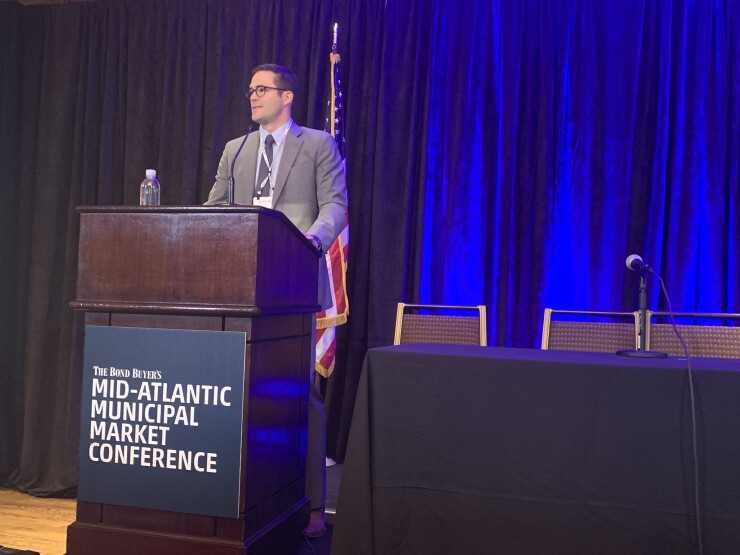PHILADELPHIA — The looming expiration of a federal highway bill could provide a catalyst for expanding bonds as a financing tool to fund critical transportation projects.
Ryan Abraham, principal at Ernst & Young’s Washington Council, said during The Bond Buyer’s Mid-Atlantic Municipal Market Conference Thursday that there should be enough bipartisan support to extend the Fixing America’s Surface Transportation Act next year despite challenges of a divided government amid a presidential election. Abraham said the FAST legislation, which was approved in July and expires Sept. 30, 2020, provides a chance for new transportation funding vehicles that may include additional private activity bond (PAB) use first approved in a 2005 federal highway bill or restoring tax-exempt advance refunding bonds.

“It is more likely that something can be added because Congress has to do this otherwise the federal government stops providing funding to states and localities to pave roads, build bridges,” said Abraham, who beore joining EY spent 14 years at the Senate Finance Committee serving under former Chairman Max Baucus, D-Mont., and current Ranking Member Ron Wyden, D-Ore. “That could be an opportunity … to add some financing to what is a funding bill.”
The 2005 Safe, Accountable, Flexible, Efficient Transportation Equity Act included $15 billion of private activity bonds added for surface transportation projects. Abraham said since nearly all of the $15 billion been has been allocated, Congress may opt to add a few billion more to the previous PAB allowance.
Abraham said there also would also be a strong case to restore advanced refundings as another financing tool for infrastructure after they were stripped out of the 2017 Tax Cuts and Jobs Act. He said trade groups are already aggressively lobbying capital hill to bring back advanced refundings and a bipartisan bill was
Reinstating a form of direct-pay borrowing such as the former Build America Bonds program will be another debt strategy debated in the lead-up to the FAST reauthorization with support from Sen. Wyden and Rep. Richard Neal, D-Mass., who chairs the House Ways and Means Committee. Abraham said this form of bonding faces tough odds because of large-scale Republican opposition stemming from BABs originating under a stimulus program signed by President Barack Obama in 2009.
The FAST extension deadline will also spark a longstanding debate, according to Abraham, about raising the federal gas tax for the first time since 1993. He said other funding sources to pay for the bill could include implementing taxes on vehicle miles traveled, carbon usage or rollbacks to the TCJA when the top corporate tax rates were slashed to 21% from 35%.
Beyond 2020, Abraham does not foresee any major tax changes on the horizon since Congress will likely remain split and 60 votes are needed in Senate to pass most bills. He said that while there will be 23 Senate seats up for grab with Democrats only needing to take two or three to retake control, only four of those races will likely be competitive.
“Either way whether you’re concerned about Donald Trump’s policies and what those might mean or Elizabeth Warren on the other side, they are probably going to be tempered by a Congress that is divided,” Abraham said. “The chances of the Senate flipping back are pretty low and that is because the country is very polarized.”





